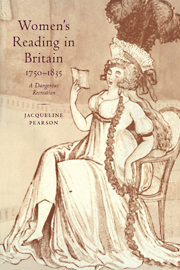Book contents
- Frontmatter
- Contents
- Preface
- Introduction
- 1 Pygmalionesses and the pencil under the petticoat: Richardson, Johnson and Byron
- 2 What should girls and women read?
- 3 The pleasures and perils of reading
- 4 Pleasures and perils of reading: some case histories
- 5 Where and how should women read?
- 6 Preparing for equality: class, gender, reading
- 7 A dangerous recreation: women and novel-reading
- Conclusion
- Notes
- Select bibliography
- Index
3 - The pleasures and perils of reading
Published online by Cambridge University Press: 22 October 2009
- Frontmatter
- Contents
- Preface
- Introduction
- 1 Pygmalionesses and the pencil under the petticoat: Richardson, Johnson and Byron
- 2 What should girls and women read?
- 3 The pleasures and perils of reading
- 4 Pleasures and perils of reading: some case histories
- 5 Where and how should women read?
- 6 Preparing for equality: class, gender, reading
- 7 A dangerous recreation: women and novel-reading
- Conclusion
- Notes
- Select bibliography
- Index
Summary
Many women enjoyed reading as ‘pure pleasure’, ‘cheap’, but ‘an unspeakable benefit’, capable of ‘softening the cruellest Accidents … there is no Remedy so easy as Books’, but pleasure itself could also be a problematic area. Anne Grant loved books, but felt guilty about literary pleasure: she enjoyed Byron's poems but worried about their morality, and was ‘fully convinced of the bad tendency’ of the works of Peter Pindar exactly because of ‘the amusement I derive from them’. Reading might corrupt the woman reader or distract her from household concerns, but the very pleasure which was its major advantage might be equally its chief moral problem.
One reason for this lies in the period's constant elision of textuality and sexuality, especially in the case of women, whose reading is repeatedly figured as a sexual act or seen to reveal their sexual nature. In Mary Hays’ clandestine courtship with John Eccles, her coded signal to him that she was alone was to ‘lay a book against the window’. Reading could, in fiction and real life, figure and facilitate a virtuous relationship: Maria Josepha Holroyd was drawn to her soldier-husband by shared literary tastes, with ‘Madame Roland's works’ representing ‘classical ground in our history’, and in Inchbald's Nature and Art (1796) the virtuous relationship of Rebecca and Henry is cemented by shared reading, for Henry ‘never read a book from which he received improvement, that he did not carry … to Rebecca's, in contrast with William's seduction of the ‘illiterate’ Hannah (1, pp. 132, 180).
- Type
- Chapter
- Information
- Women's Reading in Britain, 1750–1835A Dangerous Recreation, pp. 87 - 121Publisher: Cambridge University PressPrint publication year: 1999



